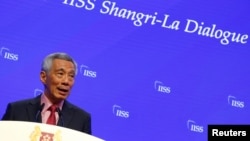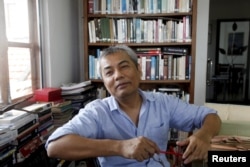The Cambodian and Vietnamese governments have reacted to remarks by Singaporean Prime Minister Lee Hsien Loong ahead of and during a regional summit last week, during which Mr. Lee described the Vietnamese intervention in Cambodia in 1979 as an “invasion.”
Last week Hun Many, the youngest son of Cambodian Prime Minister Hun Sen, and a lawmaker responded on Facebook to Mr. Lee’s Facebook post in which he discussed a letter he sent to the Thai government to express his condolences for the death of former Thai Prime Minister General Prem Tinsulanonda. In the post, Mr. Lee highlighted the role of the late Thai military leader in keeping Thailand and four other non-communist member countries of the Association of Southeast Asian Nations secure from “Vietnam’s invasion of Cambodia” under the Khmer Rouge and preventing the international recognition of the new Cambodian government installed under Vietnamese occupation.
Mr. Hun Many responded on Facebook that he was “beyond surprised” with Mr. Lee’s social media remarks. The lawmaker further adds that while he understood that Mr. Lee’s views reflected the polarizing geopolitical contexts of the 1970s and 80s, “one should not overlook nor forget the atrocities and crimes against humanity, especially genocide that were committed by the Khmer Rouge regime” on “close to 3 million innocent victims.”
While Mr. Hun Many did not directly suggest that the term “invasion” be replaced by his Cambodian People Party’s long-standing reference of Vietnamese “liberation,” the lawmaker further added, “While everyone [was] playing politics, Cambodians prayed that it did not matter who and from where the help would come from, but we wanted to be saved from the Genocidal regime of the Khmer Rouge. The help came in form of CPP with the assistance of our neighboring country Vietnam.”
Differing historical interpretations of the 1979 military intervention by neighboring Vietnam to topple the Khmer Rouge regime in Cambodia as either an “invasion” or “liberation” is the subject of long-standing national and regional sensitivity that causes occasional stir.
At the opening of this year’s annual Shangri-La Dialogue security summit in Singapore, Prime Minister Lee Hsien Loong repeated the “invasion” reference he posted earlier in the day to a host of regional delegates attending the event.
“After the Cold War ended, the US became the sole superpower. Southeast Asia entered a new phase. The Indochinese wars finally ended, and the communist countries opened up,” Mr. Lee said, adding that, “Earlier, Vietnam had invaded Cambodia, thus posing a serious threat to its non-communist neighbours. But now Vietnam joined ASEAN, together with Cambodia, Laos and Myanmar. It was a case of beating swords into ploughshares.”
Cambodian defense minister Tea Banh, who just returned from the Singapore summit, told VOA Khmer Tuesday the use of “Vietnam’s invasion of Cambodia” is “unjust” to volunteering Vietnamese troops as well as suffering victims of the genocidal Khmer Rouge whom those troops helped “liberate”.
The defense minister said during the weekend summit that he had raised Cambodia’s “upset” on the issue with his Singaporean counterpart, defense minister Ng Eng Hen.
“We told him that those words are not correct. So how he [Singapore] wishes to adjust [those words] is [their] rights. We would not correct or demand a correction here or there.”
Cambodia’s defense minister Tea Banh said he did not expect the “Vietnam’s invasion” comments to cause any major diplomatic stir between Cambodia and Singapore and other ASEAN members, saying that the comments were general and this was a case of historical misunderstandings.
Sok Eysan, spokesman for the ruling Cambodian People’s Party said that as a Khmer Rouge victim, he understood that the suffering of millions of Cambodians at the time should not be ignored and as such his view is that Vietnam’s intervention was a “liberation”.
But the spokesperson downplayed the diplomatic impact the Mr. Lee’s words would cause.
“He said this in the context of 1979. Cambodian views like mine, Mr. Hun Many’s, or the Cambodian government’s are also tied to the context of 1979. At the time, Mr. Lee Hsien Loong was not facing a genocidal experience like us. So his version of that moment is his own matter.”
Sok Eysan told VOA Khmer that ultimately it is the peoples of Singapore, Cambodia, and Southeast Asia who can decide whether his words are right or wrong.
Both the Singaporean and Vietnamese embassies could not be reached on Tuesday. But in a tweet Tuesday night, a spokesperson of Vietnam’s ministry of foreign affairs said that Vietnam “regretted” the word choice by Mr. Lee Hsien Loong.
The Vietnamese government has also reacted to the remark, calling it a “regrettable” action that “causes a negative impact on the public opinion.”
Foreign affairs spokesperson, Le Thi Thu Hang, responded in a statement published on the ministry's website, citing a verdict from the Khmer Rouge tribunal last November, saying that Vietnam contributed and sacrificed with the Cambodian people to put an end to the genocidal regime.
“This verdict is an objective testimony to historical truth, serves justice and makes restitution to the victims, which was welcomed by the United Nations and the international community.”
Youk Chhang, a Cambodian historian and director of the Documentation Center of Cambodia, said he is not surprised with the remarks from a top leader of the country [Singapore], where the teaching of history, social sciences, and human rights are not priorities compared to trade and economics.
“I think it is important for ASEAN's human rights community to create programs or an obligation to enhance education on this matter [history of ASEAN]. If there is still a division between ASEAN’s co-founders and ASEAN members, it will affect the unity of ASEAN members among the nation,” he said.
“I think that the debate between the term 'liberation' or 'invasion' should be scientifically discussed in schools,” he added.







